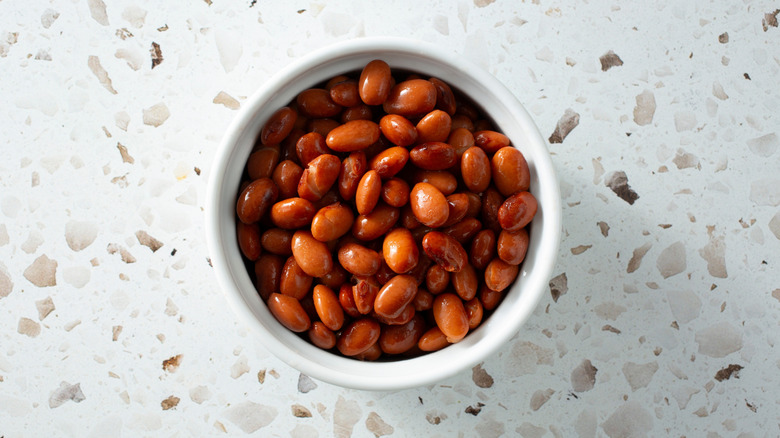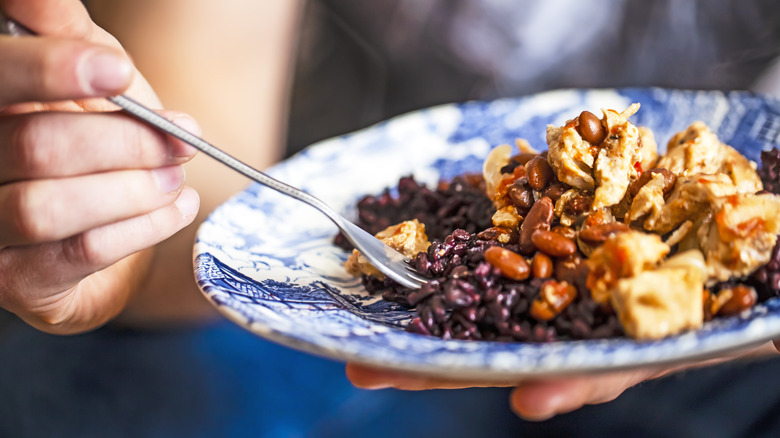The Unique Type Of Bean That Can Lower Blood Pressure And Keep You Full
Beans might not top your list of favorite foods, but they're an unsung hero in many delicious meals. Chili without beans wouldn't have the same hearty texture. And rice feels incomplete without a warm scoop of beans on the side. Beyond taste and texture, beans are packed with protein and fiber, which help keep you full and your blood sugar steady. That combo can go a long way in helping to prevent chronic health issues like obesity and type 2 diabetes.
Pinto beans, in particular, are a staple in dishes like refried beans, tortilla pies, and chalupas. They also bring a lot more to the table than just flavor. One cup of cooked pinto beans delivers an impressive 15 grams of protein and 15 grams of fiber, making them seriously satisfying. Pinto beans are also good sources of iron, selenium, and B vitamins. In fact, pinto beans offer almost 75% of your daily value of folate. What's more is that pinto beans are low in sodium (just as long as you rinse them if you're using canned beans) and high in potassium and magnesium. That makes pinto beans a great choice if you're watching your blood pressure.
The nutrients in pinto beans that reduce blood pressure
The U.S. Centers for Disease Control and Prevention says that people take in too much sodium and not enough potassium in their diets. The excess sodium in the diet may partially explain why almost half of people in the United States have high blood pressure. Getting enough potassium in your diet while limiting sodium is a good way to manage your blood pressure. Potassium helps keep your sodium levels balanced while reducing the stress on your blood vessels. The American Heart Association recommends at least 3,500 milligrams of potassium per day to prevent or treat high blood pressure. Pinto beans have 745 milligrams of potassium.
Don't forget about the magnesium in pinto beans. You'll find that pinto beans have 86 milligrams of magnesium per cup, which is about 20% of your daily magnesium needs. Magnesium helps control blood pressure by regulating how much sodium and calcium are in your cells. Magnesium also helps relax your blood vessels. According to a 2011 review in The Journal of Clinical Hypertension, magnesium works more effectively to manage your blood pressure if your diet is low in sodium and high in potassium. If you're on blood pressure medication, magnesium will help make it more effective. Just half a cup of pinto beans a day may help reduce your risk of hypertension by 43%, according to a 2022 study in Nutrients.
Pinto beans are good for your gut and cholesterol
While a half cup of pinto beans a day may help keep your blood pressure in check, they can also improve your cholesterol levels to further lower your risk of heart disease (try adding baking soda to make beans less gassy). In a 2007 study in the Journal of the American College of Nutrition, people ate either ½ cup of pinto beans, black-eyed peas, or carrots daily for 8 weeks. Blood tests showed that when the people ate the pinto beans, their total cholesterol dropped by an average of 19 points, and their LDL ("bad") cholesterol fell by 14 points.
Pinto beans are also good for your gut because of their resistant starch. A 2007 study in The Journal of Nutrition had people eat either pinto beans or an isocaloric chicken soup each day for 12 weeks. Those who ate pinto beans produced more of a beneficial compound called propionate, a short-chain fatty acid made when gut bacteria ferment the fiber in beans. Propionate is known to help regulate appetite, manage blood sugar, and reduce inflammation. Bean eaters also had lower levels of potentially harmful compounds like isovaleric and isobutyric acids.


